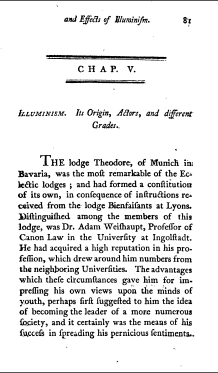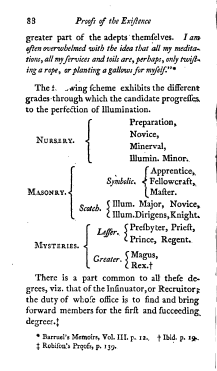StarlightGazette-X Contents
Proofs of Illuminism: Contents

Proofs of Illuminism
Chapter 5
Illuminism; its Origin, Actors, and different
grades

posted: March 2022
Original published book at archive.org
To aid better comprehension of these texts
modern English has replaced the Old English spelling
and paragraphs have been broken into sections or sentence lines.
Otherwise, the text remains as it was when published in 1802.

(page 81 thru 88)
The lodge Theodore, of Munich in Bavaria,
was the most remarkable of the Eclectic lodges;
and had formed a constitution of its own,
in consequence of instructions received from the lodge Biensaisants at Lyons.
Distinguished among the members of this lodge, was Dr. Adam Weishaupt,
Professor of Canon Law in the University at Ingolstadt.
He had acquired a high reputation in his profession,
which drew around him numbers from the neighboring Universities.
The advantages which these circumstance gave him
for impressing his own views upon the minds of youth,
perhaps first suggested to him the idea
of becoming the leader of a more numerous society,
and it certainly was the means of his success
in spreading his pernicious sentiments.
The bold opinions in religion and politics,
which were more openly taught in the lodge Theodore than in any other,
and which Knigge labored to propagate,
Weishaupt was the first to reduce to a regular code.
His scheme appears to be calculated,
not so much for uniting persons of similar sentiments in one society,
as for seducing those of opposite inclinations,
and by a most artful and detestable process,
gradually obliterating from their minds
every moral and religious sentiment.
It is in this view principally that this plan of seduction
calls for the attention of mankind,
as it developes the secret, insidious policy
by which the agents of faction and infidelity lead on their disciples,
still concealing their real designs,
until the mind is involved in a maze of error,
or entangled in snares from which there is no retreat.
Another trait which deserves particular notice
in this prime theory of deception,
is that artful structure by which the deluded victim
is led to give his support to a system, which, in its invisible operation,
is undermining the object of his fondest attachment.
Persons have subscribed to this constitution who,
had they been aware of its tendency and issue,
would sooner have committed their hand to the flame. *
* Robison's Proofs, p. 82, 85.
Barruel's Memoirs, Vol. III. Chap. I.
What those particulars were in Weishaupt's early life,
which were confessedly "great deviations from pure morality,"
we are not told; but the history of his illuminated career,
and his conduct while he sustained the dignified office
of a professor in a University,
certainly give us no favorable idea of that part of his life,
which is acknowledged to be immoral.

We here lay before the reader a letter,
found among the original writings of the Illuminees in Bavaria,
from Weishaupt to Hertel Canon of Munich,
but under the feigned names of "Spartacus to Marius."
"September, 1783.
"Now let me, under the most profound secrecy,
lay open the situation of my heart; I am almost desparate.
My honor is in danger, and I am on the eve of losing
that reputation which gave me so great an authority over our people.
My sister in law is with child.'
How shall I restore the honor of a person
who is the victim of a crime that is wholly mine?
We have already made several attempts to destroy the child;
she was determined to undergo all; but Euriphon is too timid.
Could I depend on Celse's secrecy,
(Professor Buder at Munich)
he could be of great service to me;
'he had promised me his aid three years ago.'
Mention it to him if you think proper.
If you could extricate me from this unfortunate step,
you would restore me to life, to rest, to honor, and to authority.
If you cannot, I forewarn you of it,
I 'will hazard a desperate blow,'
for I neither can nor will lose my honor.
I know not what devil ***
[Here decency obliges us to be silent.]
It is not too late to make an attempt, for she is only in her fourth month.
Do think of some means which can extricate me from this affair.
I am yours, Spartacus."
Other letters to different persons upon the same subject,
and of a similar import, were found with this.
Though he had solemnly denied his having used,
or even being acquainted with means of abortion;
yet, when the matter became public,
he admits the facts respecting his sister in law,
and the attempt to destroy the child,
but justifies himself with an effrontery
which discovers still more than the crime itself,
a mind lost to every sentiment of goodness.
"This," he says, "is far from proving any depravity of heart.
In his condition, his honor at stake, what else was left him to do?
His greatest enemies, the Jesuits, have taught,
that in such a case it is lawful to make way with the child.
In the introductory fault, he has the example of the best of men.
The second was its natural consequence; it was altogether involuntary;
and, in the eye of a philosophical judge,
who does not square himself
by the harsh letters of a blood thirsty lawgiver,
he has but a very trifling account to settle." *
* Robison's Proofs, p. 130 to 134.
Barruel's Memoirs, Vol. III. Chap. I.
In connection with the character of the founder of the sect,
it may be proper to bring into view, those of his Areopagites, *
in whom he principally confided,
and who were seated next himself in the government of the society.
He himself furnishes the portrait in a letter to Cato, (Zwack.)
(my note) * Hill of Ares (Mars' Hill).
The highest judicial court at Athens.
Its sessions were held on Mars' Hill.
Hence, any high court or tribunal
"I have received," he writes,
"the most fatal intelligence from Thebes.
They have given a public scandal, by admitting into the lodges
that vile "Propertius," a libertine,
loaded with debts, and a most detestable being.
Our "Socrates," who could be of the greatest use to us,
is always drunk;
our "Augustus" has acquired the worst of reputations;
the brother "Alcibiades" is perpetually sighing
and pining away at the feet of his landlady;
"Tiberius" attempted to lay violent hands on Diomede's sister,
and suffered himself to be caught by the husband;
"Heavens! what men have I got for Areopagites !"
It appears that it was not the detestable nature of these actions
which excited his disgust, but their influence on the reputation of his order,
for he further writes,
"Judge yourselves what would be the consequence,
if such a man as our Marcus Aurelius (Feder) were once to know
what a set of men, destitute of morals;
what a set of debauchees, liars, spendthrifts, bragadocios, and fools,
replete with vanity and pride, you have among you, &c." *
* Robison's Proofs, p. 114.
From several expressions in his letters,
it appears that Weishaupt had, for a considerable time,
been meditating the plan of
an order which should in time govern the world;
but it was not fully completed when he first put his system in operation,
and instituted the "order of the Illuminees."
This was done in May, 1776,
by the initiation of two of his University pupils;
but the order was not fully established till 1778. *
* Robison's Proofs, p. 107.
Barruel's Memoirs, Vol. III. Chap. I.
Ibid. Vol. IV. p. 55, 56
Weishaupt's aim in the frequent reviews,
and nice touches which he gave his plan,
was first, to explore every avenue to the heart,
every process by which he might most effectually seduce,
and lead men blindfold;
and in the next place, to provide sufficiently for his own security;
for, nothwithstanding the sentence of
banishment
which he was under
drew from him the most grievous complaints of despotic cruelty,
he considered it a much lighter punishment
than that which awaited him in case of detection.
In a letter to Cato, he writes,
"I daily put to the test what I made last year,
and I find that my performances of this year are far superior.
You know the situation in which I stand.
It is absolutely necessary that I should, during my life,
remain unknown to the greater part of the adepts themselves.
I am often overwhelmed with the idea that all my meditations,
all my services and toils are, perhaps, only twisting a rope,
or planting a gallows for myself." *
* Barruel's Memoirs, Vol. III. p. 12.

The following scheme exhibits the different grades
through which the candidate progresses
to the perfection of Illumination.
NURSERY.
Preparation, Novice, Minerval, Illumin. Minor.
MASONRY.
Symbolic.
Apprentice, Fellowcraft, Master
Scotch.
Illum. Major, Novice,
Illum. Dirigens, Knight.
MYSTERIES.
Lesser. Presbyter, Priest, Prince, Regent.
Greater. Magus, Rex. *
* Ibid. p. 19.
There is a part common to all these degrees, viz.
that of the Insinuator, or Recruitor;
the duty of whose office is to find and bring forward members
for the first and succeeding degrees. *
* Robison's Proofs, p. 139.

